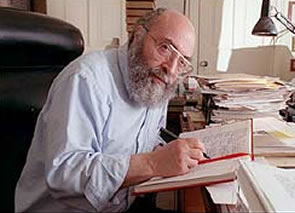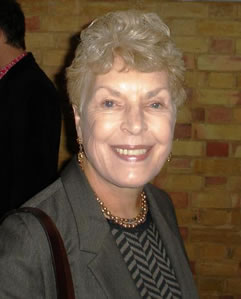De Duitse dichteres, schrijfster en caberetiere Emmy Hennings werd geboren op 17 februari 1885 in Flensburg. Toen zij achtien was trouwde zij met een amateurtoneelspeler. Ze sloten zich bij een gezelschap aan en trokken het land door. Hun dochtertje groeide op bij de grootouders. In 1904 liet Hennings zich scheiden en trad voortaan op als caberetiere. Alleen en bij diverse gezelschappen. Vanaf 1914 werkte zij mee aan het satirische tijdschrift Simplicissimus. Daarbij leerde zij Hugo Ball kennen. Zij ging met hem mee naar Zwitserland en richtte met hem en anderen (waaronder Jean Arp enTristan Tzara) het cabaret Voltaire op in Zürich – het begin van het dadaïsme. In 1920 trouwde zij met Ball.
Ätherstrophen
Jetzt muß ich aus der großen Kugel fallen.
Dabei ist in Paris ein schönes Fest.
Die Menschen sammeln sich am Gare de l’Est
Und bunte Seidenfahnen wallen.
Ich aber bin nicht unter ihnen.
Ich fliege in dem großen Raum.
Ich mische mich in jeden Traum
Und lese in den tausend Mienen.
Es liegt ein kranker Mann in seinem Jammer.
Mich hypnotisiert sein letzter Blick.
Wir sehnen einen Sommertag zurück…
Ein schwarzes Kreuz erfüllt die Kammer…
‘Morfin’
Wir warten auf ein letztes Abenteuer
Was kümmert uns der Sonnenschein?
Hochaufgetürmte Tage stürzen ein
Unruhige Nächte – Gebet im Fegefeuer.
Wir lesen auch nicht mehr die Tagespost
Nur manchmal lächeln wir still in die Kissen,
Weil wir alles wissen, und gerissen
Fliegen wir hin und her im Fieberfrost.
Mögen Menschen eilen und streben
Heut fällt der Regen noch trüber
Wir treiben haltlos durchs Leben
Und schlafen, verwirrt, hinüber…

Emmy Hennings (17 februari 1885 – 10 augustus 1948)
De Iraanse schrijfster Shahrnush Parsipur werd geboren op 17 februari 1946 in Teheran. In 1973 sloot zij haar studie sociologie af aan de universiteit van Teheran en studeerde toen tot 1980 Chinese taal en cultuur aan de Sorbonne in Frankrijk. In de late jaren zestig schreef zij de eerste korte verhalen. In 1969 verscheen Tupak-e Qermez (De kleine rode bal). Vanaf de jaren tachtig verscheen haar werk steeds meer in tijdschriften in Iran. Haar tweede boek was Touba of het belang van de nacht, dat zij schreef na een verblijf van vier jaar in de gevangenis. Eind jaren zeventig verscheen Zanan-e bedun-e mardan (Vrouwen zonder mannen), een korte roman die uit verschillende, met elkaar verbonden verhalen, bestond. De Iraanse regering verbood het boek en oefende druk uit op de schrijfster om iets dergelijks niet meer te schrijven. In 1990 voltooide Parsipur haar vierde boek, een duizend bladzijden tellende geschiedenis van een vrouwelijke Don Quijote, Aql-e abi’rang (In het Engels vertaald als Blue-colored Reason) en dat tot 1992 niet verkocht kon worden. Shahrnush Parsipur verliet Iran omdat het haar niet mogelijk was er langer te werken. Tegenwoordig woont zij in de VS.
Uit: Touba and the Meaning of Night
„During his years at the seminary school, as a teenager and shortly after puberty, Haji Adib had believed that the sky was the husband of the earth. Haji loved the sleeping lady earth in autumn and winter. In the winter, when snow covered everything, he thought of the sleeping lady earth who cradled wakefulness in her sinews until the sudden tremble of thunder and rain in the spring. In autumn–which was the spring of the mystics, according to his father–he would go on long walks to hold communion with the clean, quiet and motionless lady. Without knowing it, he was in love with the earth. He had a feeling of support for her, even though he knew that in the end it would be this same earth’s job to take him into her, to disintegrate and to digest him. Still, in his mind Haji supported the earth. His hidden excitement would reach its peak when, in his games of fantasy
, he imagined himself higher and grander than the lady earth. There could be no doubt that the eternally motionless lady, half asleep and half awake, needed infinite protection. And yet, how could the lady who was so large, so very large that she was perhaps infinite–how could she have a protector? A grander thing could not be conceived. The bittersweet sadness that filled him at the discovery of his own smallness seemed odd even to him. In those days there had been a vague rumor about the roundness and finiteness of the earth, but his loving feelings for her prevented the young man from believing it. Perhaps this was the reason he had not learned the new sciences. And since he did not discuss these matters with anyone, he was naturally categorized among the scholars of the old school. Coming home from school every day and passing the basement rooms of his parental home, he could hear the women of the family talking, continuously and relentlessly, as they wove their carpets. The sound of their shuttle combs on the looms created a delicate rhythm that accorded with the laws of spring, summer, autumn and winter. Haji was also the protector of these women. There was no grandeur here to frighten him. He thought, “We have our own four walls.” And even in the near-infinite grandeur of the lady earth, he felt that his four walls had a place of their own. His parental courtyard had rectangular garden patches and an octagonal pool in the middle. Deep in his mind, he felt that he stood at the center where the pivot housed the wheel, turning the sky dome without cessation.”

Shahrnush Parsipur (Teheran, 17 februari 1946)
De Amerikaanse schrijver Chaim Potok werd geboren in New York City op 17 februari 1929. Zie ook mijn blog van 17 februari 2007.
Uit: Old Men at Midnight
“Noah was brought to our brooklyn neighborhood by his aunt and uncle, and into my life by an announcement on the bulletin board of our synagogue: sixteen-year-old boy from europe needs english tutor.
This was early in the summer of 1947, two years after the end of the Second World War. No name, just a telephone number.
I called that night. A woman answered.
“Hello, who is it?” She sounded fretful, harried. “Who is calling, please?”
I said in Yiddish, “A good week.”
There was a slight pause. “Ah, a good week,” she said. Her tone softened.
I said in English, “My name is Davita Dinn. I’m calling about your request for an English tutor.”
In the background I heard children crying. Turning away from the phone, she shouted something in Yiddish, which I did not understand. Into the phone she said, “You have done this before, teach English?”
“Yes. But not to a European survivor.”
“How old are you?”
“Nearly eighteen.”
“Where do you live?”
I told her.
“We will come to you. Is it all right tomorrow at three?”
I was alone when they arrived. Answering the front door bell, I saw a stocky, plain-looking woman in her thirties, garbed in a dark-gray dress that reached to below her knees. The dress had a frilly high neck and long sleeves. Standing a little behind and to her right was a thin boy in his teens, wearing a white long-sleeved shirt, dark trousers, and a dark skullcap.”

Chaim Potok (17 februari 1929 – 23 juli 2002)
De Spaanse dichter Gustavo Adolfo Bécquer werd op 17 februari 1836 in Sevilla geboren. Zie ook mijn blog van 17 februari 2007
XLI
Tú eras el huracán y yo la alta
torre que desafía su poder:
¡tenías que estrellarte o que abatirme!
¡No p
odía ser!
Tú eras el océano y yo la enhiesta
roca que firme aguarda su vaivén:
¡tenías que romperte o que arrancarme!
¡No podía ser!
Hermosa tú, yo altivo: acostumbrados
uno a arrollar, el otro a no ceder:
la senda estrecha, inevitable el choque…
¡No podía ser!
XLI
Du bist der Hurrikan und ich der hohe
Turm, der seiner Macht misstraut:
Du musstest mich zerschmettern oder niederreissen!…
Es konnte nicht sein!
Du warst der Ozean und ich der steil aufragende
Felsen, der Deines Auf und Ab standhaft harrte,
Du musstest Dich entzweien oder auf mich losbrausen!…
Es konnte nicht sein!
Du schön, hochmütig ich; der eine daran gewöhnt,
sich fortzuwälzen, der andere daran, nicht nachzugeben,
der Pfad verengt, unvermeidbar der Schock…
Es konnte nicht sein!
Vertaling door Arne-Wigand Baganz

Gustavo Adolfo Bécquer (17 februari 1836 – 22 december 1870)
De Britse schrijfster Ruth Rendell werd geboren als Ruth Grasemann in Londen op 17 februari 1930. Zie ook mijn blog van 17 februari 2007
Uit: The Water’s Lovely
“Weeks went by when Ismay never thought of it at all. Then something would bring it back or it would return in a dream. The dream began in the same way. She and her mother would be climbing the stairs, following Heather’s lead through the bedroom to what was on the other side, not a bathroom in the dream but a chamber floored and walled in marble. In the middle of it was a glassy lake. The white thing in the water floated toward her, its face submerged, and her mother said, absurdly, “Don’t look!” Because the dead thing was a man and was naked and she was a girl of fifteen. But she had looked and in the dreams she looked again, but at Guy’s drowned face. She had looked at the dead face and though she would forget from time to time what she had seen, it always came back, the fear still there in the dead eyes, the nostrils dilated to inhale water, not air.
Heather showed no fear, no emotion of any kind. She stood with her arms hanging by her sides. Her dress was wet, clinging to her breasts. No one spoke then, neither in the reality nor in the dreams, neither of them said a word until their mother fell on her knees and began crying and laughing and babbling nonsense.
When she came home the house was a different place. She had known, of course, that it would be two self-contained flats, the upper one for her mother and Pamela, the lower one for her and Heather, two pairs of sisters, two generations represented. In her last term at university, four hundred miles away in Scotland, what she hadn’t understood was that part of the house would disappear.”

Ruth Rendell (Londen, 17 februari 1930)
Zie voor onderstaande schrijvers ook mijn blog van 17 februari 2007
De Duitse schrijver Georg Britting werd op 17 februari 1891 geboren in Regensburg.
De Australische dichter Andrew Barton “Banjo” Paterson werd geboren op 17 februari 1864 in Narambla in New South Wales.
